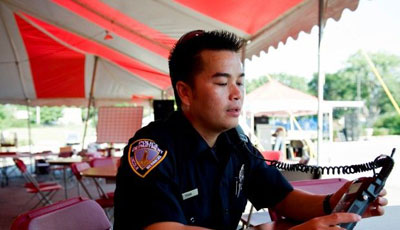By Nicholas Bergin, Lincoln Journal Star
At age 5, Tu Tran seemed an unlikely candidate to become a police officer in a Midwestern college town.
Lincoln Police Officer Tu Tran pats 5-year-old Thien-An Pham on the head at the annual Viet-Linh Festival on Saturday, Aug. 24, 2013, at Immaculate Heart of Mary Catholic Church.

His family shared a one-room house with a roof of straw and palm leaves in a small South Vietnamese farm village. Instead of going to kindergarten, he worked with his sister picking up plastic bags and seeds to sell.
“I’m pretty sure back then … my parents, older brothers and sisters were terrified of them,” Tran said of police. “Back in Vietnam, they can do whatever they want with no consequences.”
It’s a fear Tran’s family — and many others from volatile, oppressed regions — brought when they came to Lincoln as political refugees.
Today, Tran is 27, has been a cop for three years and is on the front lines of the Lincoln Police Department’s efforts to increase its diversity and foster trust with minorities. He is one of six officers to have passed the department’s proficiency test for a second language — the only one to pass for a language other than Spanish.
Tallest in the world
Tran’s father, Tri Tran, was in the South Vietnamese Army. He was captured after the fall of Saigon in 1975 and sent to a camp.
“They called it a re-education camp, but it was more of a work labor camp,” his son said.
Tri Tran toiled in that camp for eight years before returning to his family and the small village where he farmed.
In 1992, he and his wife brought their eight children to the United States and settled in Lincoln with the help of Catholic Social Services.
The day they arrived was cold, Tu Tran said, mid-November and snowing.
“I can remember I was still in my T-shirt and shorts. It was cold, but it wasn’t that cold because I was so amazed. It was the first time I’d seen snow.”
The family’s sponsors drove them through downtown on the way to their new home. To Tran’s 6-year-old eyes, the buildings seemed the tallest in the world.
His dad got a job with a window manufacturing company making $10 an hour. The family often lived paycheck to paycheck, but overall they were happy, Tran said.
He learned English at school, but his parents wanted him to learn their language, too, and signed him up for classes at church.
Lincoln’s Vietnamese community was small then, and life centered around Immaculate Heart of Mary, where families gathered on weekends to sell egg rolls, sauces made with chili peppers and spiced beef soup with rice noodles to support the congregation. The air smelled of garlic, lemongrass and ginger, Tran recalls.
How’d you get my number?
Tran’s cellphone number passes through the Lincoln Vietnamese community from hand to hand.
“The other day, somebody called me instead of 911 on a domestic disturbance.
“They can call 911, but they don’t know what to say. They think ‘what happens if Tu isn’t working? How am I going to tell the officers what is going on?’”
Tran doesn’t mind. It’s what he signed up to do.
Vietnamese tradition says family matters stay within the family. But tempers boil, neighbors argue, lovers quarrel, fists connect. Someone calls 911, and police show up. People are angry, scared. They speak in rapid Vietnamese, broken English or not at all.
It’s a scene police have seen countless times and heard in dozens of languages, including English, said Capt. Genelle Moore, who commands LPD’s Education and Personnel unit.
“Because they come from a place where the police are the government and the government is the police, they are hesitant to reach out to us,” she said. “Sometimes we get these calls for service, domestics or bad assaults where somebody needs to be hospitalized, but nobody wants to step forward to make a complaint or be a witness. They are afraid if they open their mouths, something bad is going to happen to them.”
Police have developed a pool of community members able and willing to translate 11 languages for them and also uses LanguageLinc, a Lincoln-based business that provides professional interpreters.
A trained officer who shares the same background and speaks the language is a valuable asset, Chief Jim Peschong said.
Still, it can be hard to get people to open up and break ingrained taboos.
“They still don’t trust police,” Tran said. “It is a problem I’m trying to explain to people. ‘It’s OK. You can talk to me.’
“I’ve had people tell me, ‘Don’t tell the other officers that he said he was going to kill me,’ or things like that. ‘Please don’t tell anybody. Please don’t document that. I’m just telling you. Keep it a secret.’”
He can’t do that, he explains; he has a job to do.
Read the full article by Nicholas Bergin from Lincoln Journal Star.

